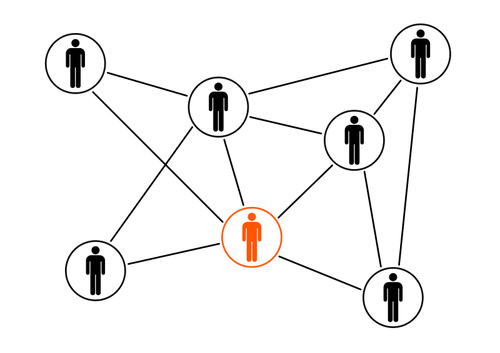
The Social Networks & Anticholinergics Project (SNA-P) is a 1-year pilot randomized controlled trial applying social network science to study and improve the change in medication safety awareness and behavior. The project is a partnership between:
IU Center for Aging Research
- Dr. Richard Holden (PI)
- Dr. Noll Campbell
- Dr. Malaz Boustani
- Dr. Patrick Monahan
IU Network Science Institute
- Dr. Kate Eddens
- Dr. Anne Krendl
- Dr. Brea Perry
PROJECT ABSTRACT
One in three older adults consumes medications with anticholinergic effects, despite evidence linking anticholinergics to long-term brain harm. National entities therefore promote “evaluation of medication awareness and education programs and materials.” Our work has generated such direct-to-consumer educational interventions, but we have not evaluated their dissemination.
We propose to pilot a social network strategy for intervention dissemination, to raise anticholinergic awareness. Specific aims are to: (1) Assess the level of feasibility of leveraging personal social networks to disseminate a brief educational intervention (i.e., a network intervention) and (2) Test the effect of the network dissemination strategy.
For Aim 1, we will enroll 100 cognitively normal community-dwelling adults aged ≥60 years to receive our educational intervention about anticholinergics. To test the feasibility of the social network dissemination strategy, half will be randomized to receive training as change agents. At 4-week follow-up we will assess feasibility, defined as: (a) number of word-of-mouth contacts initiated about anticholinergic risk, per participant (Number of Contacts); and participant perceptions of (b) the contacts’ receptiveness to the information (Receptiveness) and (c) behavioral intention to speak to a health professional about anticholinergic risk (Behavioral Intention).
For Aim 2, we will estimate effect sizes and compare Number of Contacts, Receptiveness, and Behavioral Intention at 4-week follow-up between those randomized to education plus change agent training vs. education alone.
Our transdisciplinary, translational research team is ideally suited to this project due to its unique combination of expertise in systems engineering, health behavior change, pharmacy, network science, geriatrics, and biostatistics.
FUNDING STATEMENT
This project receives support from the Indiana Clinical and Translational Sciences Institute funded, in part by Award Number UL1TR002529 from the National Institutes of Health, National Center for Advancing Translational Sciences, Clinical and Translational Sciences Award. The content is solely the responsibility of the authors and does not necessarily represent the official views of the National Institutes of Health.